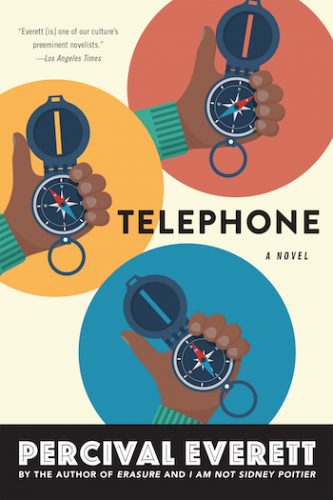Book Review: “Telephone” — Sounding Alternatives
By Landry Harlan
The “choose your own adventure” turns out not to be a gimmick; setting up alternatives makes Telephone more affecting than Everett’s self-consciously directionless narrative may deserve.
Telephone by Percival Everett. Graywolf Press, 232 pages, $16.

It was supposed to be a secret. Three near-identical covers plastered with three distinct endings. Just imagine the heated book club debates — what really happened? Then COVID-19 struck and the ever-playful polymath Percival Everett felt he had to ditch his trick. In the idiosyncratic Telephone, his latest novel, a family’s predictable life is shattered by a random fatal disease. Perhaps the parallels with the real world were so striking that Everett felt he couldn’t hide his long game. Oh, what might have been — a readership surprised by a narrative with a multiple-choice ending.
Zach Wells expects bad things to happen and spends his days trying to salvage whatever he can. He’s a jaded “geologist-slash-paleobiologist” who delivers lifeless lectures, studies decayed bird bones, and endures a stagnating marriage. Not even a flirtatious student and well-meaning colleague can snap him out of the malaise. It’s only during chess matches and banter with his precocious 12-year-old daughter Sarah that he opens up. He adores her and makes it his mission to “to keep this creature alive, to keep this little bird breathing.”
Then, the seizures begin. Sarah is diagnosed with a rare terminal disease. The fault lines open up. Everett vividly portrays the slow deterioration of Sarah’s mind — first she misses chess moves and later doesn’t recognize her parent’s faces — as Zach helplessly looks on. He attempts to cope clinging to his guiding philosophy of passivity; he longs to “rescue” Sarah, but suspects he can’t stave off the inevitable.
Instead, in a bizarre turn, Zach is distracted himself by mysterious notes, in Spanish, placed inside of clothes he orders from an online shop. One reads “Ayúdame” (“help me”). Perhaps, he thinks, there is someone he can save. Without telling the family where he’s going, he drives to New Mexico to find answers and escape the “terrifying situation at home.”
Zach’s private investigation takes up the last chunk of the short 232-page novel. It is a bold but ultimately disappointing choice. The family drama is riveting enough. A trip to Paris with Sarah becomes a desperate search for her in a crowd of protestors. Zach’s attempts to cling to what he loves of Sarah are powerful, his grief and loss palpable. The pair stagnate in the “hotter” New Mexico. A new cast of one-note characters — a friendly waitress, armed neo-Nazis — provide an uptick in terms of the plot, but the result is dramatic whiplash that leads to an unsatisfying conclusion.
The hero’s journey into the desert gambit is a far cry from Zach’s wish to keep Sarah, his “bird” alive, and it muddles the story’s elemental father/daughter relationship. The subplot takes over. It’s not that the pulpy thriller ingredients are used badly. Over the course of his 30 books Everett has crisscrossed genres with ease, from westerns to satire. Genuine suspense is generated during the escape scene as well as in a tense bus drive to freedom. The problem is that Zach’s foolhardy rescue mission doesn’t just serve as a distraction for him; it is a distraction for the reader, who may well wonder what has happened to Sarah.
That said, maybe the plot takes a different turn in the copy you read. Inspired by the game of telephone, in which the “real” message blurs as it moves down the chain of speakers, it’s up to the reader to accept what they read. It is satisfactory? Or should they search for one of the variations? The “choose your own adventure” turns out not to be a gimmick; setting up alternatives makes Telephone more affecting than Everett’s self-consciously directionless narrative may deserve. Like Zach, readers must do some juggling: accept what’s in front of them and then take action over the little they can control. Maybe there’s a better ending out there for Zach. Maybe it’s worse. You’ll have to pick up another copy of Telephone to find out.
Landry Harlan is a writer based in Cambridge. He has written no books, but will happily and honestly tell you what he thinks about yours.

I have read lots of reviews of this book but I have not seen any that mention the conclusion about Sarah that I came to. That Zach Wells kills his daughter. Was I reading too much into his actions or too much between Everett’s lines?? I convinced my book group last evening of my interpretation but now I wonder??
I’d like your insight into this. Thank You.
[…] Quote from the source: … […]